In today’s global connectivity, people often travel between countries for tourism and other purposes. However, there are some countries where American tourists face restrictions beyond points. There can be several political, historical, or cultural reasons that make Americans restricted from visiting countries. Here’s the list of countries where Americans are not welcome and the travel advisory puts it under “Do Not Travel”. Let’s have a look at those countries’ reasons and facts.
Myanmar

In 2021, Myanmar experienced significant political conflicts that constrained relationships with various countries, including the United States. The United States Travel Advisory advises its citizens not to travel to Myanmar due to the ongoing civil unrest, risks of wrongful detention, violence, and inadequate health care following a military coup in February 2021.
There is a scare of illegal detention alongside landmines that you can find anywhere.
North Korea

North Korea is one of the few countries where Americans are restricted to travel. As per the United State Department, the government is against travel to North Korea for safety purposes. The United States government can not provide emergency services to its citizens due to a lack of diplomatic relations and an embassy.
In fact, the travel advisory wants you to draft a will before you leave for this country.
Yemen

Yemen, like Myanmar, doesn’t welcome American visitors due to its ongoing civil war, terrorism threats, and risks of kidnappings against foreigners. The closure of the United States Embassy leaves American citizens unprotected and more vulnerable to violence in Yemen.
There is a high risk of kidnapping, forced marriage, coercion, assault and more. The US Department of State not only want you to draft a wish, but also tell your funeral wishes, and arrange custody for your children.
Afghanistan

Travel to Afghanistan is strongly discouraged due to frequent terrorist attacks, kidnappings of Westerners, and other serious security risks. The closure of the U.S. Embassy in Kabul in 2021 has further heightened dangers, including unlawful detentions.
US citizens, specifically, are targets of unlawful detention and kidnapping. You are advised to prepare for the worst.
Iraq

Usually, there exists a complicated relationship between America and Iraq, so an individual thinks twice before visiting there. Even if a person desires to visit Iraq, he has to proceed with several visa processes. It includes some document proofs such as a passport, driving license, and a brief letter providing information regarding a visit to Iraq, and requires some deposit fee.
The travel advisory starts with “Do not travel to Iraq due to terrorism, kidnapping, armed conflict, civil unrest, and Mission Iraq’s limited capacity to provide support to U.S. citizens.”
Russia

Avoid traveling to Russia due to several factors including the unpredictable aftermath of the unprovoked invasion of Ukraine by Russian military forces, potential harassment, and targeting of U.S. citizens for detention by Russian government security officials.
Additionally, US credit and debit cards are no longer accepted in Russia, and electronic money transfers are limited due to sanctions on Russian banks.
Iran

The United States has a complex relationship with Iran due to several political and historical reasons. The economic sanctions passed by the US Government also contribute to this. Plus, ongoing political issues like Iran’s nuclear program and regional policies have led to a sense of doubt and disbelief toward Americans. The U.S. Department of State advises not to travel to Iran due to the risk of terrorism, civil unrest, kidnapping, and the arbitrary arrest of U.S. citizens.
You are advised to draft a will and leave DNA samples with your healthcare provider.
Sudan

Sudan, ranked 170th on the Human Development Index, is one of the world’s least-developed countries, facing severe poverty, political instability, and widespread violence. It’s under a strict “do not travel” advisory due to armed conflicts, civil unrest, and frequent terrorist attacks targeting Westerners, aid workers, and urban areas, with rural regions also posing risks due to hidden explosives.
The US government’s capacity to offer consular services in South Sudan is severely restricted, further complicating matters for travelers. It’s crucial to exercise extreme caution and carefully consider the risks before planning any travel to this region.
Somalia

Somalia, located on Africa’s eastern coast next to Ethiopia and Kenya, is known for its long coastline but faces extreme poverty, ranking last on the Human Development Index. It’s unsafe for American visitors due to frequent terrorist attacks, violent crime in crowded areas, illegal roadblocks, and high risks of kidnappings and detentions.
Due to the absence of a permanent US presence in Somalia, the US government’s capacity to offer consular assistance is severely limited. This means that if travelers encounter difficulties while in Somalia, they may not have access to the usual support and services provided by US consular officials.
As a precautionary measure, the US advisory suggests designating one family member as a point of contact with potential hostage takers and establishing a protocol for verifying proof of life with loved ones.
Syria

Americans are advised against visiting Syria due to ongoing violence, internal conflicts, corruption, and high risks such as kidnappings and illegal detentions. The U.S. State Department strongly discourages travel to Syria due to these dangerous conditions, which pose threats to the safety and security of American citizens.
Ukraine

The Department of State continues to advise that U.S. citizens not travel to Ukraine due to active armed conflict. U.S. citizens seeking emergency assistance should email KyivACS@state.gov for assistance.
The advisory recommends drafting a will, leaving DNA samples, and designate custody and funeral wishes
Libya

Avoid traveling to Libya due to the significant risks posed by crime, terrorism, civil unrest, kidnapping, and armed conflict. Terrorist organizations are actively planning attacks in the country, and violent extremist activity remains prevalent. Extremist groups have issued threats targeting both US government officials and citizens.
The U.S. government is unable to provide emergency or routine assistance to U.S. citizens in Libya, as the U.S. Embassy in Tripoli suspended its operations in July 2014.
Venezuela

Avoid traveling to Venezuela due to the prevalence of crime, civil unrest, kidnapping, and the arbitrary enforcement of local laws. Additionally, reconsider travel plans due to the risk of wrongful detentions, terrorism, and the inadequate healthcare infrastructure in the country. The US Department of State withdrew diplomatic personnel from the US Embassy in Caracas on March 11, 2019, resulting in the suspension of all consular services, both routine and emergency, until further notice.
Haiti

Avoid traveling to Haiti due to the high risk of kidnapping, crime, civil unrest, and inadequate healthcare infrastructure. On July 27, 2023, the Department of State instructed the departure of family members of US government employees and non-emergency US government employees from the country.
Some of the recommendations are
- If you are being followed as you leave the airport, drive to the nearest police station immediately.
- Travel by vehicle to minimize walking in public.
- Always keep vehicle doors locked and windows closed when driving.
Burkina Faso

Do not travel to Burkina Faso due to terrorism, crime, and kidnapping.
The US government cannot offer emergency assistance to US citizens in the majority of the country because US government personnel are prohibited from traveling to areas beyond the capital due to security reasons.
If you still decide to go, have evacuation plans that do not rely on U.S. government assistance.
Central African Republic

Avoid traveling to the Central African Republic (CAR) due to the limited capacity of Embassy Bangui to assist US citizens, as well as the risks associated with crime, civil unrest, and kidnapping.
If you do go, appoint someone to speak with your hostage-taker just in case and establish a proof of life with loved ones.
Mali

Terrorist and armed groups in Mali persist in planning kidnappings and assaults, often launching these attacks suddenly and without warning. They target various locations such as nightclubs, hotels, restaurants, places of worship, international diplomatic missions, and other areas popular among foreigners. Additionally, they may target Malian government facilities and infrastructure, as well as locations frequented by Westerners.
